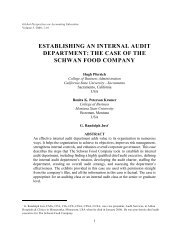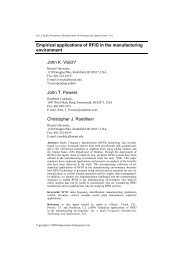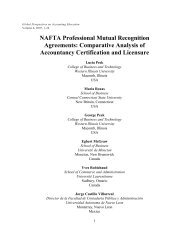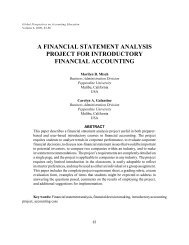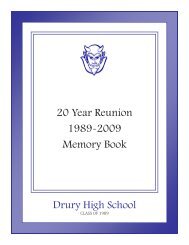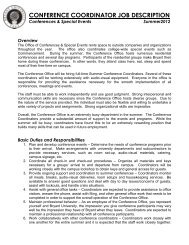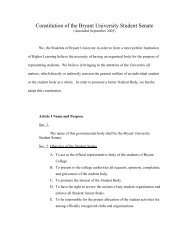Why use multiple-choice questions on accounting - Bryant
Why use multiple-choice questions on accounting - Bryant
Why use multiple-choice questions on accounting - Bryant
Create successful ePaper yourself
Turn your PDF publications into a flip-book with our unique Google optimized e-Paper software.
<str<strong>on</strong>g>Why</str<strong>on</strong>g> Use Multiple Choice Questi<strong>on</strong>s 43than ambiguous or poorly-worded <strong>on</strong>es. On the other hand, we have no reas<strong>on</strong> to believe that theMC <str<strong>on</strong>g>questi<strong>on</strong>s</str<strong>on</strong>g> <str<strong>on</strong>g>use</str<strong>on</strong>g>d here were different enough to invalidate our study results. Similarly, for testtakers, we acknowledge that the motivati<strong>on</strong> for studying and passing certificati<strong>on</strong> examinati<strong>on</strong>s maybe greater than for passing college examinati<strong>on</strong>s, and that other differences in testing envir<strong>on</strong>mentsare also likely to be at work here.Finally, we note that the theoretical advantages of CR examinati<strong>on</strong> <str<strong>on</strong>g>questi<strong>on</strong>s</str<strong>on</strong>g> in assessingdeep understanding of subject matter can be diminished significantly by improper item compositi<strong>on</strong>or hurried or inadequate grading. However, proper item compositi<strong>on</strong> is a factor with MCexaminati<strong>on</strong>s as well, and increases in impact at the higher levels of knowledge that might betargeted by such <str<strong>on</strong>g>questi<strong>on</strong>s</str<strong>on</strong>g>. Moreover, we would hope that for those certificati<strong>on</strong> examinati<strong>on</strong>scomposed by public certificati<strong>on</strong> groups and intended to be administered to <str<strong>on</strong>g>multiple</str<strong>on</strong>g> audiences overan extended period of time, both the compositi<strong>on</strong> of examinati<strong>on</strong> items and the grading ofexaminati<strong>on</strong>s would be at the highest levels.SUMMARY AND CONCLUSIONSThere are many reas<strong>on</strong>s why employers, employees, and the <strong>accounting</strong> professi<strong>on</strong> itself allvalue professi<strong>on</strong>al certificati<strong>on</strong>, an esteem reflected by the large number of certificati<strong>on</strong>examinati<strong>on</strong>s available to individuals. Our review of such certificati<strong>on</strong> examinati<strong>on</strong>s found thatalmost all of them rely solely <strong>on</strong> <str<strong>on</strong>g>multiple</str<strong>on</strong>g>-<str<strong>on</strong>g>choice</str<strong>on</strong>g> <str<strong>on</strong>g>questi<strong>on</strong>s</str<strong>on</strong>g> for testing purposes–a format that hasmany grading advantages but little structural fidelity. For a wide variety of reas<strong>on</strong>s, MC tests arethemselves c<strong>on</strong>troversial and not universally accepted as the best assessment tools for measuringprofessi<strong>on</strong>al <strong>accounting</strong> competencies–c<strong>on</strong>structed resp<strong>on</strong>se tests such as computati<strong>on</strong>al <str<strong>on</strong>g>questi<strong>on</strong>s</str<strong>on</strong>g>are usually preferred as theoretically superior metrics.The questi<strong>on</strong> we sought to answer was whether there was any relati<strong>on</strong>ship betweenperformance <strong>on</strong> these two types of tests. In our empirical study of this relati<strong>on</strong>ship across a sampledomain of 10 separate classes and nearly 450 students, we found a positive relati<strong>on</strong>ship betweenperformance <strong>on</strong> the MC and CR porti<strong>on</strong>s of their tests, but not a particularly str<strong>on</strong>g <strong>on</strong>e. At best,what this means is that the two types of <str<strong>on</strong>g>questi<strong>on</strong>s</str<strong>on</strong>g> measure different, but perhaps <str<strong>on</strong>g>use</str<strong>on</strong>g>ful, things. Atworst, it means that MC <str<strong>on</strong>g>questi<strong>on</strong>s</str<strong>on</strong>g> <strong>on</strong>ly examine rudimentary levels of knowledge–or perhapsnothing other than the MC test taking ability of the applicants.Our inability to find a str<strong>on</strong>ger relati<strong>on</strong>ship between CR and MC test formats does not meanthat MC tests do not assess some form of knowledge. They almost certainly do. The issue is whetherwhatever knowledge is tested by less tractable, but perhaps more probing and structurally viable CRtests, can also be tested efficiently by MC tests.What does all this mean to certificati<strong>on</strong> examinati<strong>on</strong>s? The findings from this study suggestthat certificati<strong>on</strong> examinati<strong>on</strong>s based solely <strong>on</strong> MC <str<strong>on</strong>g>questi<strong>on</strong>s</str<strong>on</strong>g> may not be testing applicants at thesame level as CR tests might. Of greater c<strong>on</strong>cern is the possibility that the final scores <strong>on</strong> suchcertificati<strong>on</strong> tests may actually be giving false signals about what applicants do or do not know. Itis possible such tests may be denying some applicants the opportunity to dem<strong>on</strong>strate what they doknow. For these reas<strong>on</strong>s, we encourage certificati<strong>on</strong> examiners to follow the lead of the CPA examdevelopers and include at least some CR <str<strong>on</strong>g>questi<strong>on</strong>s</str<strong>on</strong>g> <strong>on</strong> their tests.REFERENCESBac<strong>on</strong>, D. R. 2003. Assessing Learning Outcomes: A Comparis<strong>on</strong> of Multiple-Choice and ShortAnswer Questi<strong>on</strong>s in a Marketing C<strong>on</strong>text. Journal of Marketing Educati<strong>on</strong> (Vol. 25) 31-36.



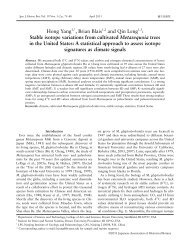
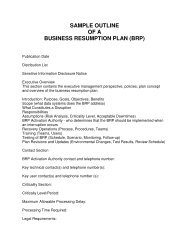
![[1] The Legal Environment of Business (LGLS211) Andrea Boggio ...](https://img.yumpu.com/45269009/1/190x245/1-the-legal-environment-of-business-lgls211-andrea-boggio-.jpg?quality=85)
